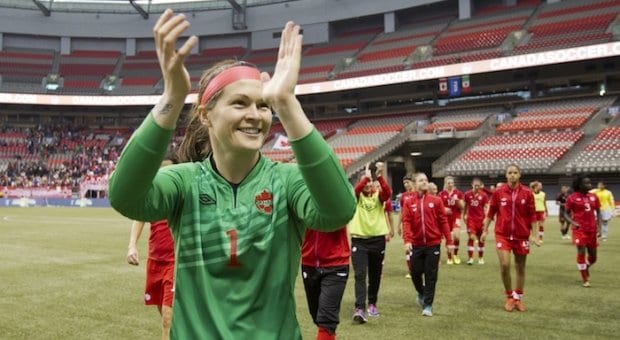A year and a half after Erin McLeod helped make Olympic history for the Canadian women’s soccer team — which eventually won the bronze medal — people still stop her to talk about that game, when Canada lost to the US following a controversial call.
McLeod, Canada’s goalkeeper and a proudly out lesbian, was at the centre of the action; she was penalized using a rarely called rule about how long the keeper can hold the ball.
It was a national heartbreaker at the time, as the team seemed destined for the championship game, but they still became the first Canadians to medal in a “traditional” Summer Games team sport since 1936. Not bad, all things considered.
So despite more than a decade playing top-tier soccer, competing at the 2007 Women’s World Cup and in the 2008 Beijing Olympics, it’s not surprising McLeod looks at the 2012 London Games as her career highlight so far.
“When I get stopped in the street, people still want to talk about the US game and the controversy,” says McLeod, who currently plays for the Chicago Red Stars in the National Women’s Soccer League. “They talk about how they felt so bad for us . . . I’m glad we were the team that people got so emotional about.”
The highs and lows of that tournament, and McLeod’s career so far, fuel more than just her play on the pitch. A thoughtful and personable speaker, the Alberta native lectures to a variety of groups on goal-setting and learning from failure. She’s also a prolific artist in pencil drawings and black-and-white photography, recently exhibiting her work at Toronto’s Jane Roos Gallery.
“Soccer is a vehicle; I can apply all the things I am learning in soccer to anything I do,” she says. “I love it because I am always learning about people, how to push myself and how to push others.”
That drive is likely coming in handy these days, with McLeod and the rest of Team Canada in the midst of a four-month training session in Burnaby, BC. Each day consists of one or two practice sessions on the field and several tactical meetings about plans and strategy.
“On top of that, we do mobility work: stretching, range-of-motion stuff. A lot of us work with a movement specialist, and the goalkeepers do plyometrics,” she says, on the phone with Xtra between sessions. “We’re basically working out twice every day. We film every training session, so we’ll watch them as well.”
It’s a lot of time to spend with the same group of 14 players, but McLeod, now 30, says she’s been playing with many in this group since her teens. She came out to some of these women before her family, a testament to their closeness, but also to what she describes as a “very liberal and accepting environment” in women’s soccer.
“Our coach [John Herdman] asks about my life or if I have a significant other,” she says. “It really helps that there’s an understanding with your coach. Even if he’s addressing the group, he’ll refer to ‘spending our time off with girlfriends or boyfriends’ instead of just assuming we all have boyfriends. It’s a safe zone.”
McLeod understands that not all athletes feel as comfortable as she does being open but adds that many are simply hesitant to make a showy spectacle about their private lives.
“A lot of times people see coming out as kind of a celebrity stunt . . . especially here in Canada. They think, ‘People who love me know that I’m gay, so what’s the big deal?’”
Her own decision to be public about her sexuality came with her belief in leading by example and her hope that if enough gay athletes speak out, it will make it less necessary down the road.
“My hope is that at some point, people won’t have to come out anymore,” she says.
“I’m not necessarily screaming from the top of buildings that I’m gay and this and that, [but] with everything I do, I try to be a role model for young girls in my sport . . . part of my problem growing up, I didn’t know anyone who was gay or any gay athletes.”
McLeod says self-confidence and the support of her loved ones have made all the difference in her career. She says living honestly affects all parts of her life, including on the field.
“When you’re playing your best, you play free.”


 Why you can trust Xtra
Why you can trust Xtra


